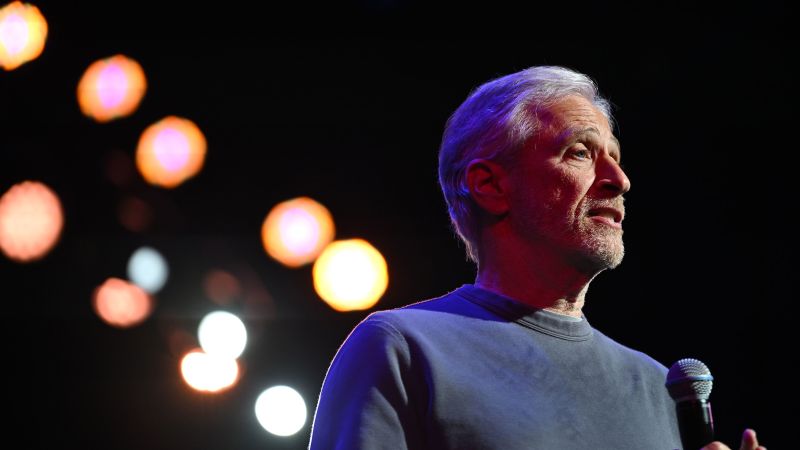**Jon Stewart’s Critique on CBS’s Cancellation of Colbert’s Show**
On Monday night, comedian Jon Stewart made headlines during the broadcast of “The Daily Show” as he openly criticized CBS for their controversial decision to cancel Stephen Colbert’s highly-rated late-night show. This broadcast marked Stewart’s first appearance since Colbert disclosed that “The Late Show” would end its run in May 2026. In his characteristic passionate style, Stewart addressed CBS’s lack of effort to preserve their long-standing late-night franchise, which has entertained audiences for over three decades.
Stewart’s critique centered around the idea that CBS’s decision, which he deemed particularly puzzling, could be attributed to the financial implications of their ongoing merger with Skydance Media. Paramount Global, CBS’s parent company, has been maneuvering to secure regulatory approval for this merger, and some observers have speculated about a possible link between the cancellation and the company’s financial strategies. While CBS publicly stated that declining revenues in an increasingly competitive late-night landscape prompted the cancellation, Stewart highlighted underlying issues, questioning if it was merely a strategic business decision or indicative of a more profound corporate capitulation.
In typical Stewart fashion, the host did not mince his words when expressing his discontent, using strong language to underscore his points. He asserted that CBS’s approach to late-night programming seemed excessively cautious and risk-averse, especially concerning the controversial political landscape shaped in part by figures like former President Donald Trump. According to Stewart, maintaining the status quo in programming by avoiding any controversial content ultimately weakens the brand rather than strengthens it.
Stewart’s sentiments resonated with others within the late-night community, leading to a wave of solidarity among fellow hosts. Not long after Colbert announced his show’s cancellation, Jimmy Kimmel expressed his dismay on Instagram, effectively encapsulating the collective sentiment of shock and disapproval within the television landscape. Several other late-night hosts, including Jimmy Fallon and Seth Meyers, joined the chorus of support for Colbert, emphasizing their discontent regarding the cancellation and lamenting the loss of a program that has served as a touchstone for comedic political commentary for years.
Colbert himself has been at the forefront of addressing challenging political issues since he took over “The Late Show” in 2015, frequently using humor to critique the Trump administration. The show’s termination has sparked speculation regarding how such a significant decision might be influenced by external factors, including CBS’s recent legal settlement with Trump. This settlement, which involved a payment of $16 million to resolve a lawsuit over a “60 Minutes” interview, raised eyebrows among media critics who speculated about the implications for the network’s editorial independence and future programming decisions.
Moreover, Stewart noted that CBS’s financial woes cannot be ascribed solely to the late-night segment of their programming. Indeed, he argued that many successful shows that once contributed significantly to the network’s value are now being marginalized or censored as part of a broader corporate strategy to appease advertisers and stakeholders.
The intertwining of these significant events within the media landscape has undoubtedly fueled debates surrounding corporate influence on creative expression. Stewart’s call for networks to embrace authentic, sometimes uncomfortable content rather than a sanitized, corporate-friendly approach suggests a growing desire among comedians and audiences alike for substantive and fearless programming.
As the late-night community navigates the fallout from these recent developments, it remains to be seen how CBS—and media outlets at large—will adapt. The supportive responses from Stewart’s fellow hosts reflect a collective sentiment of concern over the trajectory of late-night comedy, suggesting that the industry may need to reassess its values and approach to entertainment in a rapidly changing media environment.
Finally, it is worth noting the long-standing camaraderie between Stewart and Colbert, who have shared a professional bond for nearly three decades. Their collaborations have shaped the landscape of late-night television, and the loss of Colbert’s show represents a significant chapter in that narrative. As artists and audiences mourn this pivotal change, it remains clear that the discourse surrounding media ownership, political commentary, and creative freedom will continue to be a prominent issue in the industry.











